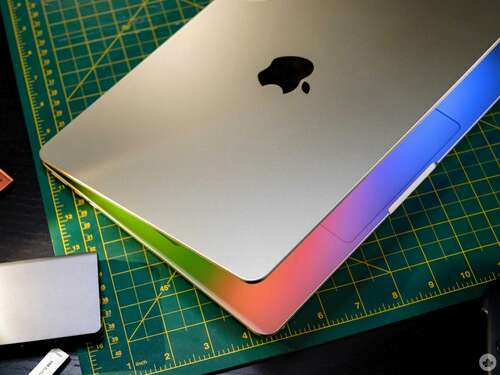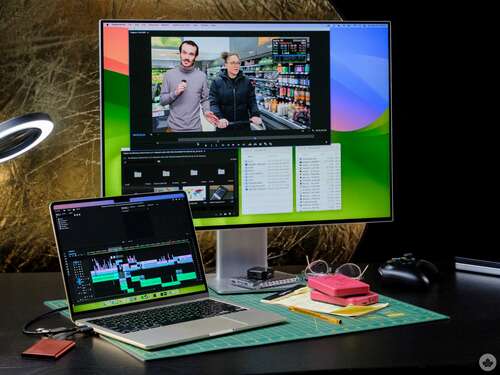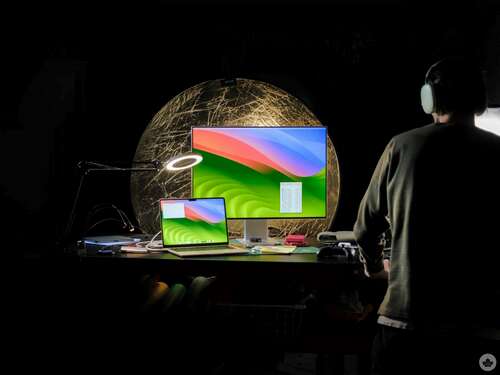Four years after the release of the M1 MacBook Air, I wasn’t expecting the same impact from the M3 version, yet it’s exceeding my expectations at every turn.
Apple has rounded out its M-series of chips with a new graphics processing unit (GPU) that’s extremely impressive for a device without a fan. Other advancements like a fast Neural Engine and Wi-Fi 6E are also welcome, but it’s the GPU that makes such a substantial difference.
This year’s MacBook Air is exceptionally versatile, and it makes me wonder how Apple is going to stop it from pushing into MacBook Pro territory over the next few years. The M3 Air springs to life as soon as you open the lid.
Flying higher than ever before
While the MacBook Air has been incredibly competent since its upgrade to the M-series chips in 2020, the M1 and M2 can struggle with graphics-intensive tasks like video rendering, 3D modelling and gaming. The new M3 chip shakes free of those limitations. There’s no doubt the dedicated GPU in a MacBook Pro still outperforms the M3 MacBook Air, but tasks the Air used to struggle with can now be completed with ease.
It’s pretty incredible.
Editing graded 4K LOG footage in Premiere Pro is smooth and I was able to run Photoshop CC on the side without maxing out the memory on the 16GB RAM model I’m testing. I expected the laptop’s performance to dip here, but it just kept powering through.
My 14-inch M1 MacBook Pro laptop offers slightly better render times, but the fluidity on the timeline is impressive with the M3 MacBook Air. For the type of YouTube video editing I do, it’s more than enough. For context, a typical edit consists of a few layers of 4K/6K footage, music/vocals, some graphics, colour grading and sound effects.
My M1 Pro MacBook with 32GB of RAM struggles with green screen footage, but the M3 Air breezes through it. That’s not to say my laptop couldn’t handle it, but to play it back smoothly, I need to render the sequence every time I edit. On the M3 Air, it plays back smoother and requires less rendering overall.
When I did need to render the process took longer than on my MacBook Pro by about 45 seconds. The time gap is much larger when rendering a whole video and not just a small sequence. Still, it’s an interesting give and take, and at the end of the day, it means anyone with a modern Mac can competently edit video. Pro users who edit every day will find value in saving time with each render, but when it comes to actually editing on the timeline, the M3 is a powerhouse.
“New games like Baldur’s Gate 3 (BG3) run on the machine, but at barely 30fps and the graphics need to be on low settings with FSR upscaling enabled.”
I’ll also mention that using the laptop to edit for extended periods didn’t affect my timeline performance. I expected that after about 25-35 minutes of taxing work, I would start to see considerable dips in power as the computer needed to thermal throttle, but it kept on powering through it. This shows how much raw power the M3 CPU has behind it, and after running some Geekbench benchmarks, it’s easy to see why since its multi-core score is much higher than comparable machines.
Gaming on the M3 impressed me the most. I remember getting my first MacBook Air in 2013 and struggling to run Minecraft on it, and now I can play 3D games at 1440p in some cases. In my hands-on with the laptop, I speculated that the chip might be close to the gaming potential of the Xbox Series S, but in reality, I think it’s closer to the Xbox One, maybe the Xbox One X in some cases, which is still no small feat.
New games like Baldur’s Gate 3 (BG3) run on the machine, but at barely 30fps and the graphics need to be on low settings with FSR upscaling enabled. This is playable for BG3 since the game is turn-based with a slow pace, but I worry action games will outpace the M3 MacBook Air quite quickly. That being said, when I try to run BG3 on my M2 Air, the M3 really proves how much more capable the GPU enhancements are with more consistent frame rates in areas with lots of NPCs.
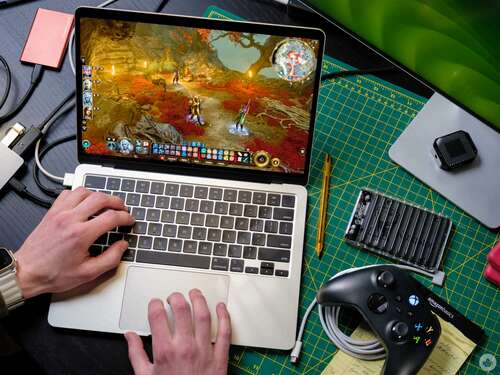
I’ve played most of BG3 on my M1 Max Mac Studio connected to my TV, and it’s been amazing. Image credit: Bradley Bennett
Gaming gets even better when it comes to older games like Death Stranding. I played the first few hours on medium settings with 1440p resolution, and it ran flawlessly plugged into a 4K TV. This game recently launched on Mac, so it’s been optimized for the modern ARM system architecture.
Games like Metro Exodus are a little less smooth but still extremely playable with frame rates between 30-50fps at 1080p low settings. I was able to play for a bit at medium, but during fights, the frames would dip to the low 20s. Strangely though, even at low settings the game slowed down randomly. The FPS monitor stated I was above 30fps, but it still felt slower. This is likely because this game runs through Apple’s Rosetta 2 translation layer since it was originally made for Intel Macs. This is a problem with many Mac-supported games on Steam. They run, and it’s exciting that the MacBook Air can handle them at all, but they don’t play as well as games that have been optimized for M-series architecture.
Trying to push things to the next level, I attempted to run Spider Man: Miles Morales through an app called Whisky. The app uses Apple’s Game Porting Toolkit to run Windows games on macOS. While the experience was fraught with troubleshooting, at the end of it, I was able to run the game smoothly enough on low settings that I could have played it if I trusted it to work in the long run. This goes to show how powerful the M3 chip is to be capable of running a modern game with zero optimization.
I wouldn’t really recommend anyone buy a Mac to try and run Windows games since it’s an unreliable method that works inconsistently and often requires you to buy other apps like Parallels to make it work. Even during my brief testing, I was unable to get Windows games to work with my Xbox controller. That said, there’s no denying that Apple is on the right track when it comes to gaming, and if more developers could be swayed to bring their older games to Apple’s ecosystem, I think the company could have a fantastic gaming platform, ranging from iPhone and iPad, all the way through the entire modern Mac lineup.
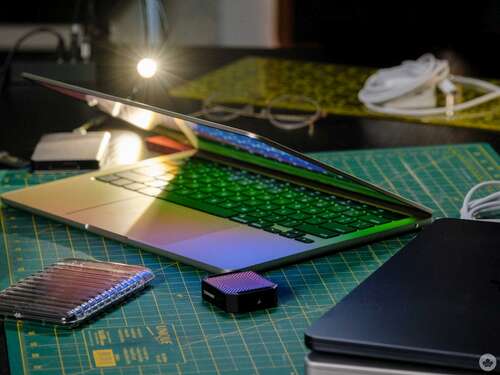
As always, the trackpad is glassy with great haptic feedback. Image credit: Bradley Bennett
The other notable improvement is the ‘Neural Engine,’ which should help future-proof this laptop as more apps take advantage of local AI. For now, it means that tasks like on-device dictation, subject detection in photos and other processes that use machine learning work faster. In the “pro” realm, this means that some video and photo editing tools are faster as long as they take advantage of the Neural Engine. That said, the extra GPU power in the Pro/Max chips does help them perform a lot better than the base-level chip in the M3 MacBook Air.
In the end, this likely isn’t the laptop you want to train AI models. Instead, it has enough power to take advantage of the modern artificial intelligence features implemented into apps and macOS over the next few years. As a photographer, I see a lot of AI tools in the market right now, so if you’re a creative looking to keep on the cutting edge of your craft, all this extra AI horsepower is at least reassuring.
Wedge who?
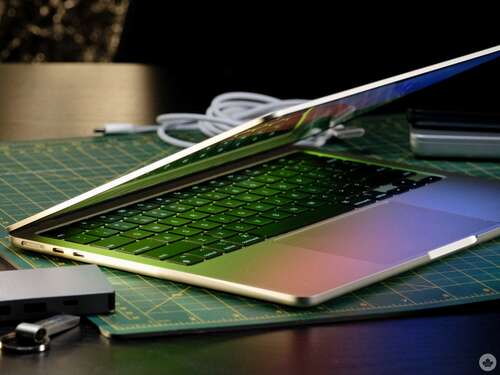
Image credit: Bradley Bennett
The M3 MacBook Air looks exactly like its predecessor and even comes in the same colours: ‘Silver,’ ‘Space Grey,’ ‘Midnight’ and ‘Starlight.’ The blue Midnight model carries over the same anodization process as the ‘Space Black’ MacBook Pro from late 2023, which should help reduce visible fingerprints.
I was lucky enough to test the Starlight model (my favourite colour), so you can read more about Patrick O’Rourke’s feelings on the new coating below. He tested the M3 and M2 15-inch MacBook Air in Midnight, plus the M3 MacBook Pro in ‘Space Black,’ so he has ample experience with Apple’s crusade against fingerprints.
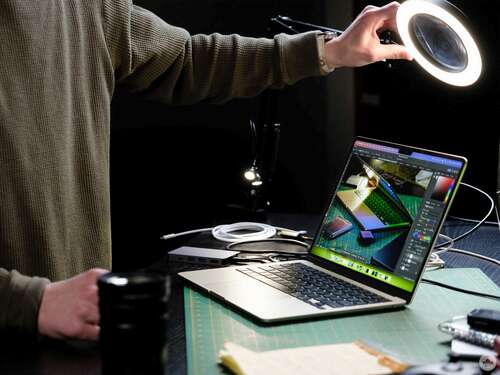
Image credit: Bradley Bennett
Beyond the look of the machine, I really like how low-profile the keyboard is. I’m used to chiclet keyboards and use the Logitech MX Keys at my desk, so the low profile setup of the Air is easy on my wrists. I find the key travel is slightly reduced compared to the MacBook Pro I’m used to working with, but the more I get used to the Air, the more I enjoy how quickly it allows me to jam on the keys. Combine that with how light and thin the notebook is, and it just makes typing on it anywhere a joy compared to my 14-inch Pro. It’s not to say that the larger machine isn’t portable, but the incredibly small size of the MacBook Air just feels more comfortable nestled on the couch or in a cafe, not to mention it’s easier to carry around all day in a bag.
At the beginning of my review period, I missed the larger 14-inch MacBook display, but only for its size, and I very quickly got used to the smaller setup on the Air. To remedy this, I shifted the display resolution to the ‘More space’ option, which makes things slightly smaller to give you more usable space. When it comes to colour and contrast, I have no complaints. The MacBook Pro is ever so slightly better, but under most circumstances, it’s not noticeable, and even for creative work, the M3 MacBook Air is easily enough.
Unfortunately, Apple didn’t add more USB-C ports to its latest laptop, so both sizes of the MacBook Air are still locked down to two USB 4.0 ports on the left side. Therefore, if you plan to buy a MacBook Air, it’s likely worth budgeting for an adapter or dongle, depending on your needs.
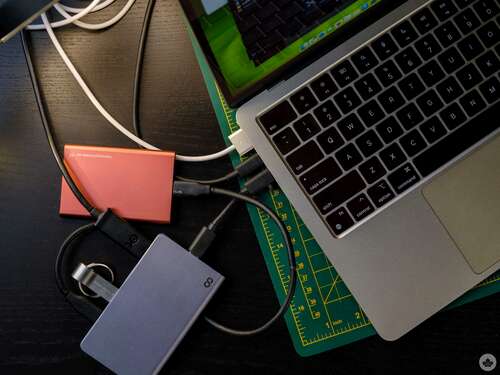
Make sure you get an adapter that has a small connection head, or it might block the other port. Image credit: Bradley Bennett
As a minor plus this year, Apple allows you to plug in two displays when the laptop’s lid is closed. However, this doesn’t work as seamlessly as you might expect. I needed to go into my settings and stop the laptop from sleeping while power is connected. Once I enabled this, I was able to close my laptop and two HDMI displays (with adapters) worked, but only when I had the charger plugged in. Newer monitors can do power/display over USB-C, which works more seamlessly, but for HDMI you need the charger plugged in. And after all of that, you need to close the lid to use multiple displays so you can’t use the trackpad, keyboard or Touch ID. Thankfully, the speaker in the laptop continues working.
It’s also worth noting that you can get adapters that can force multiple displays on older M-series MacBooks, but they typically split the screen’s feed’s quality so you can’t have several 4K monitors. With Apple’s new lid-closed solution, the company says you can power one 6K display at 60HZ and another 5K display at 60Hz.
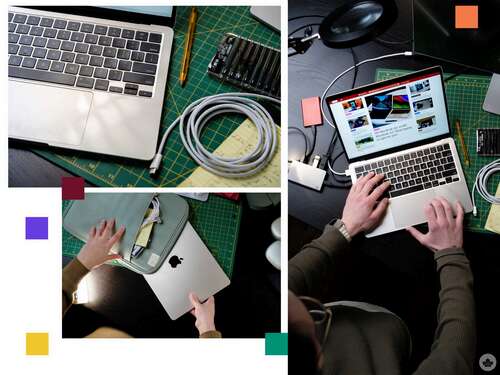 The final design element I love is how subtle the difference is between the Starlight and the Silver MagSafe cables. They’re so similar Apple could have gotten away with a white cord on each device, but the subtle cream infusion in the Starlight version shows Apple’s classic attention to detail, and it just makes me happy.
The final design element I love is how subtle the difference is between the Starlight and the Silver MagSafe cables. They’re so similar Apple could have gotten away with a white cord on each device, but the subtle cream infusion in the Starlight version shows Apple’s classic attention to detail, and it just makes me happy.
I also appreciate that you can charge this computer while using it with a basic 18-watt iPhone charger. It’s not fast, but it works and it really shows how little power the M-series Macs actually need. On that note, I recommend buyers spec their Air with the Dual Port 35-watt charger instead of the 75-watt fast charger. Personally, I rarely find myself needing to fast charge my MacBooks, but I use the dual port charger all the time when traveling to charge all kinds of stuff.
Patrick’s 15-inch Midnight Odyssey
As a relatively recent 15-inch MacBook Air convert, the new M3-powered version of the sizable laptop landed in my lap. It’s still a shockingly light and well-built laptop with a large display, only now, it offers more hardware power thanks to the new M3 chip.
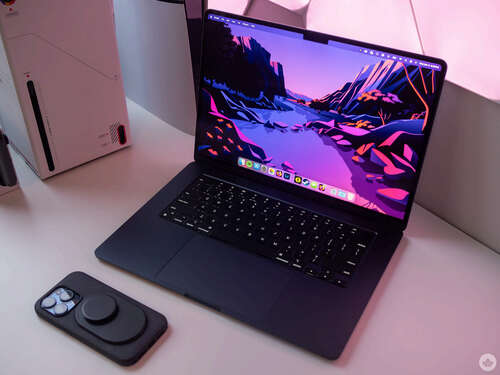
If you want a laptop with a big screen, the 15-inch M3 MacBook Air is one of the best around. Image credit: Patrick O’Rourke
But in practice, did I notice a difference in how I use the 15-inch MacBook Air? Not really, but my work includes a lot of terminally online web browsing, Photoshop CC, Lightroom CC and a bit of video and audio editing with Premiere CC and Audition CC. I could probably still be using Apple’s M1 MacBook Air, and I’d still have power headroom. On the other hand, this also speaks to the power Apple’s M-series chips offer — even a chip that released over three years ago features enough power for most people.
But back to the 15-inch MacBook Air. For most, I’d recommend using the extra cash you need to spend to upgrade to the 15-inch on adding more RAM or a bigger SSD to the 13-inch. However, if you’re set on a big-screen laptop that feels high quality and looks sleek, the 15-inch MacBook Air is the best. Every time I pull it out, it feels like a treat to use, and the extra screen real estate makes it easier to have multiple windows open at once while on the go.
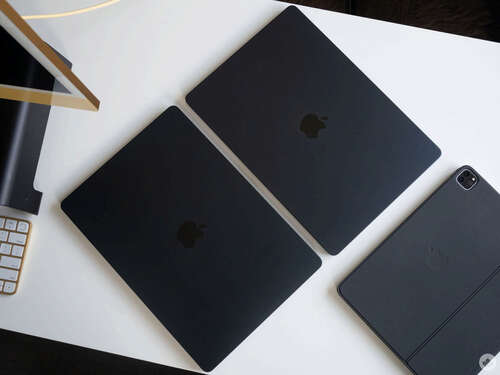
The anodization seal helps prevent grease, but it isn’t totally perfect. In this test, I placed my hand on the M3 15-inch MacBook Air (top) and, immediately after, the M2 15-inch MacBook Air (bottom). You can see the slight fingerprints on the M2 15-inch MacBook Air. Image credit: Patrick O’Rourke
As Brad mentioned earlier in this review, this year’s MacBook Air ‘Midnight’ colour features an anodization seal that reduces fingerprints. While it works, grease and smudges still often appear, although they’re slightly less apparent.
As a word of caution, the 14-inch’ Space Black’ MacBook Pro with the anodization seal I’ve been using for the past several months has had the paint rub off in one corner. Is this the fault of the anodization seal or just the fact that the laptop is a darker colour (I always keep my MacBook in a case)? I don’t know for sure, but what I can say is I’ve never had this happen with a MacBook with a lighter colour scheme before.
